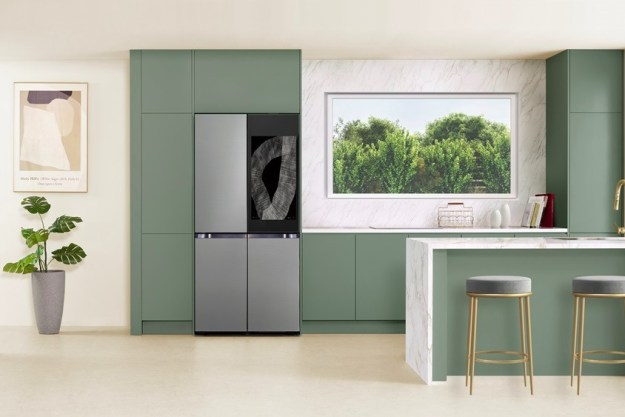No matter how smart a home is, you still need to manually set it up. Legrand, a world leader in electrical and digital building infrastructure products, recently unveiled its new partnerships with Amazon Alexa, Cisco, and Samsung for its new Internet-of-Things-focused Eliot program. Under Eliot, Legrand will work closely with Samsung’s Artik cloud platform to connect more IoT devices with one another, with the aim of delivering a fully autonomous home that is smart without you doing anything but living.
“With an autonomous home, it’s going to take a look at everything around us,” Pete Horton, vice president of market development at Legrand, told Digital Trends. “Whether it’s social media, our calendar events, emails or other things that are going to be inputted into our life.”
Samsung’s Artik was in development for more than three years before it was announced in April, according to Uwe Thomas, Samsung’s director of business development for IoT, who spoke with Digital Trends at Legrand’s Eliot unveiling event in New York City on Thursday. Thomas says Artik is “quite a huge investment from Samsung,” with 200 engineers currently working on the ambitious cloud platform.
Without getting into the technical nuts and bolts, Artik aims to be able to connect devices not originally designed to communicate with one another and let companies make IoT applications relatively easy. With the Artik, you will be able to control your Legrand lighting system with the Amazon Echo — two products not originally designed to work together. Samsung’s SmartThings door sensor could connect with the Legrand lighting switch devices so your home light turns on when the door opens and turns off when the door closes.
The autonomous home only exists in theory, but Legrand gave examples of what it would look like in a few concept videos at the event. One scenario involved a woman named Sylvia sleeping when a graphic appears on screen showing the weather changing and the home autonomously changing her commute to work based on the weather creating traffic jams, without her waking up. As she went through the start of her day, the window blinds raised three quarters of the way up to awaken her and her towel’s temperature was set to 80 degrees once the shower started. The home learned what Sylvia’s daily preferences are down to the most minute detail.
There is always a price for convenience, and the proliferation of devices connected to the internet has already had damaging results. France-based internet service provider OVH was recently hacked when 1 terabyte of data began overwhelming its servers each second via multiple massive distributed denial of service (DDoS) attacks. OVH founder Octave Klaba claimed in a series of tweets that the attack was carried out by thousands of hacked closed-circuit television (CCTV) cameras and personal digital cameras.
Basically, hackers were allegedly able to turn something as innocuous and ubiquitous as a digital camera into an soldier in an attack to compromise hundreds of websites depending on OVH.
When asked about the legitimacy of IoT devices’ malicious potential to internet security, neither Thomas nor Horton directly addressed it, but moreso explained how important security is to the Eliot program, and how the Artik will adapt if it is attacked.
“The Artik platform has features built in that remembers where you left when the internet went down, so when it comes back on it connects you with the values so you can continue to work,” Thomas said. Horton attests “security is very important to our deployment” of the Eliot program and entrusts Samsung to help with security due such Samsung products as its mobile security solution, Knox.
“We’re building the platform for future use, which means we’re going to have machine learning maybe a part of the platform,” Thomas said. Machine learning would enable Artik to take multiple pieces of data and through analytics predict what the desired outcome is. Sylvia was able to have her commute change because her home probably gathered data from weather reports, navigation systems such as Google Maps which provide traffic information, and presumably an internal log of the times she usually leaves for work.
Thorton said we will see “the first building blocks” of the autonomous home initiative next summer, and the new Artik will be backwards compatible with older Legrand lighting products.
Editors' Recommendations
- What to do if your Amazon Alexa app is not working
- The 6 best Echo Hub tips and tricks
- What is the Amazon Echo Hub?
- Echo Show 8 vs. Nest Hub: Does Amazon or Google offer the best smart display?
- What is Home Depot’s Hubspace?


